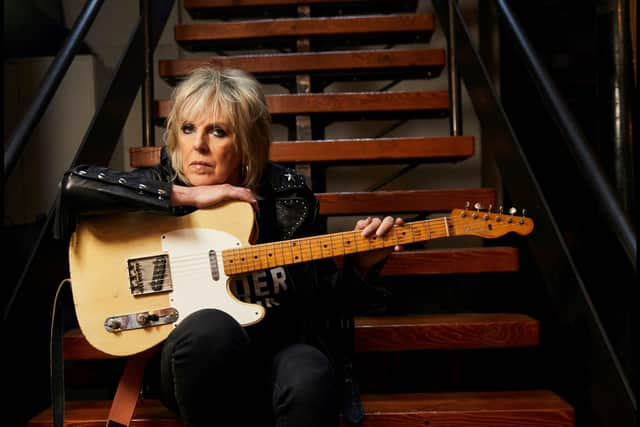Album reviews: PJ Harvey | Lucinda Williams | Meursault


PJ Harvey: I Inside the Old Year Dying (Partisan Records) ****
Lucinda Williams: Stories From A Rock N Roll Heart (Highway 20 Records) ****
Meursault: Meursault (Common Grounds Records) ****
Advertisement
Hide AdAdvertisement
Hide AdFor a while back there it looked like we had lost PJ Harvey to the realm of poetry, the documentary field trips to Kosovo and Afghanistan which inspired her previous album The Hope Six Demolition Project awakening new ways of writing and the following world tour draining her enthusiasm for music.
Last summer, she made her first Scottish appearance in years – at the Edinburgh International Book Festival, to promote a poetry collection conceived under the mentorship of Don Paterson. But a rekindling of her musical spirit was already underway and her first album in seven years is another creative volte-face, as Harvey switches from the macro concerns of Let England Shake and The Hope Six Demolition Project to a micro folk world drawn in archaic language with improvised arrangements and field recording embellishments from longtime collaborators Flood and John Parish.
On I Inside the Old Year Dying, Harvey uses the extremes of her vocal range – her haunting higher register and an androgynous alto – but it is what she is uttering that is most alluring and unsettling. Did she really just sing “speak your worldle to me” in the falsetto blues of Prayer at the Gate? It transpires that there are many more intriguing wordles where that came from – for example, “tree-tears” are leaves and “nuts” means “joy” (but also “testicles”).
Ancient rubs up against modern – the damsel protagonist of Lwonesome Tonight carries “in her satchel Pepsi fizz” – as Harvey draws on the folklore of her native Dorset and weaves in biblical, historical and Shakespearean references into a woozy bucolic landscape populated by a council of birds and a recurring character called Wyman Elvis (warrior Elvis).


There is plenty to unpick if you wish; alternatively, just follow Harvey in revelling in the sounds of words as much as the meaning and the joys of witchy blues she conjures. The stridently strummed acoustic guitar of the title track is something to hold on to, a breadcrumb trail back to previous work – the ethereal ambience of White Chalk being the closest relative to this intoxicating comeback from an artist always one step ahead.
Lucinda Williams’ comeback is wholly emotional. This remarkable singer, as comfortable with country as she is ready to rock’n’roll, had a stroke in November 2020, which rendered her unable to play the guitar to which she has been umbilically connected through her career.
“But I can still sing!” as she declared to a delighted Celtic Connections audience earlier this year. Her winning mix of the tough and vulnerable is never more suited than to this set, co-written with her husband Tom Overby and Jesse Malin.
Advertisement
Hide AdAdvertisement
Hide AdBruce Springsteen and Patti Scialfa crop up as backing vocalists on the burnished New York Comeback and she gives a withering account on strutting, stealthy rocker This Is Not My Town, but she is at her most potent on the poignant ballads Where The Song Can Find Me and Jukebox, which hail music as a saviour: “thank God for my corner bar, so close I don’t need a car”.


The slowburn of Edinburgh outfit Meursault catch fire on their self-titled sixth album, with mainman Neil Pennycook guiding a talented group of musicians to their most ambitious, fully realised collection yet. There are shades of Richard Dawson’s prog folk stylings in the stormy, rootsy Rats in the Corn and the lithe flute flurries of acoustic plea Laugh Track. Another Again has all the makings of an R&B strut with brooding Hammond organ, punk attitude and a testifying vocal, while Making the Most of the Raw Materials of Futility is lighter than its title, with its playful Grandaddy-like eddying analogue synth burbles.
CLASSICAL
Orchestral Anthems: Dyson | Howells | Elgar | Finzi (Delphian) ****
Much as the organ is traditionally the instrument of choice to accompany regular church music, there’s no escaping the transformation an orchestral arrangement can make. That’s the thinking behind this richly-scented release by the ultra-polished Choir of Merton College Oxford under director Benjamin Nicholas with the Britten Sinfonia. Some of these anthems benefited from penned arrangements by the composers themselves, from the heartwarming strings underpinning Bairstow’s Blessed City, Heavenly Salem and the effusive glow of Howell’s Behold O God Our Defender, to Elgar’s stately Ecce Sacerdos Magnus (its initial marching bass reminiscent of his First Symphony) and the symphonic expansiveness of Finzi’s Lo, The Full Final Sacrifice. Third party arrangements of Dyson’s Evening Service in D and Vaughan Williams’ Te Deum fare just as well. Elgar’s treatment of Purcell’s Jehovah, Quam Multi Sunt, though, tends towards the same stylistic anachronism as his orchestrations of Bach’s organ works. Ken Walton
JAZZ
Jonny Mansfield Quintet: The Air In Front of You (Resonant Postcards) ****
More chamber music than jazz, but beguiling nonetheless, award-winning vibraphonist Jonny Mansfield creates a distinctive sound world, at times shadowy, often vividly shimmering, in the company of violinist Dominic Ingham, cellist Midori Jaeger, bassist Will Sach and James Maddren on drums. Ripples sets the scene with languid violin and cello against cymbal murmurs, giving way to the tentative entry of Mansfield’s vibes before things intensify, vibes flitting vivaciously through a busy soundscape of drum stabs and pizzicato strings. The titular (Organise) The Air In Front of You features a repeating, folk-like fiddle air and vibes chimes against the industrious stab and whirr of Maddren’s drums, while Waves is profoundly meditative, foregrounding strings with percussion, bass and vibes gradually sidling in. Nothing here happens in a hurry, bar a brief, dazzling solo Etude from Mansfield, but all of it makes for rewarding listening. Jim Gilchrist